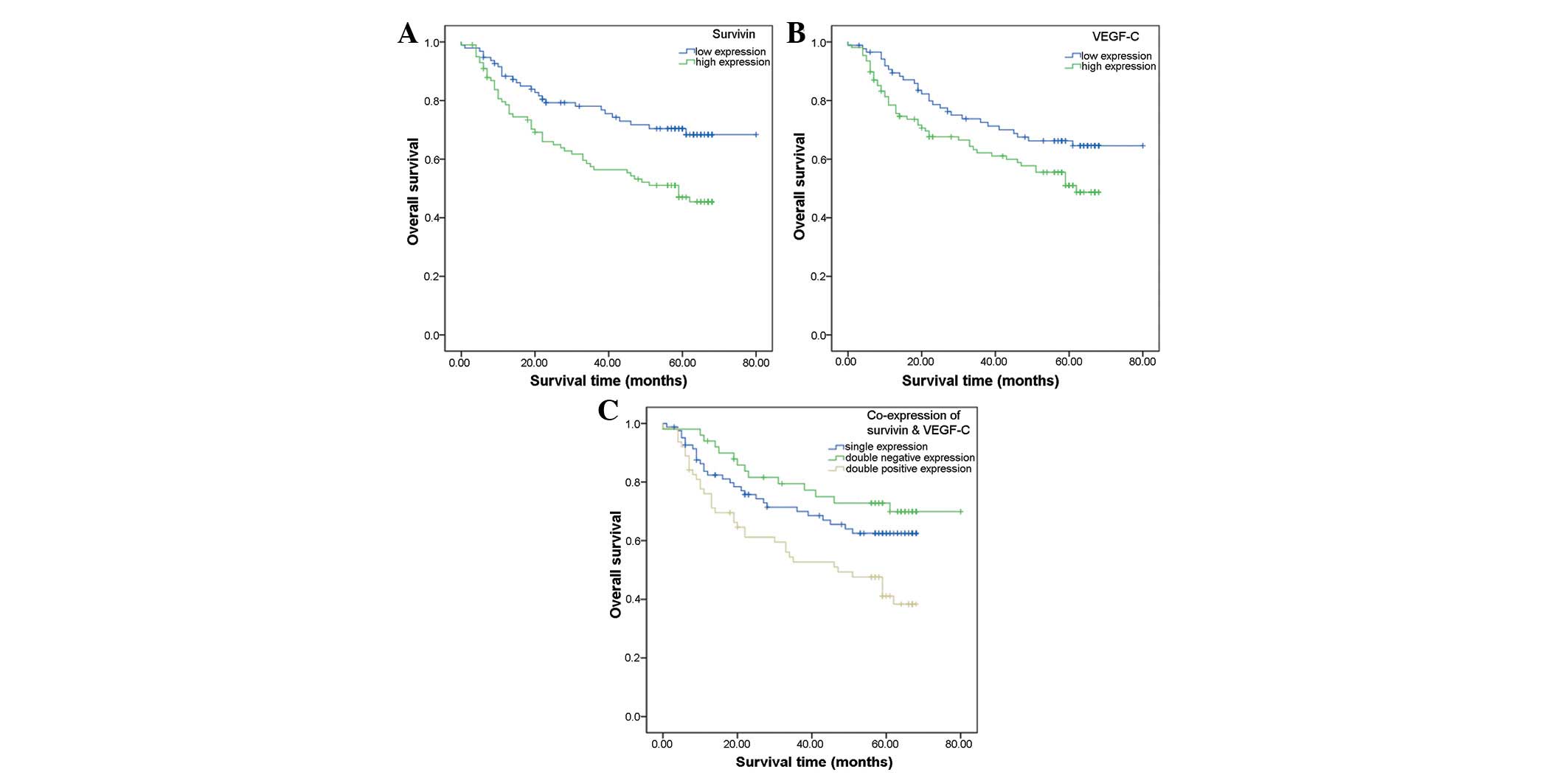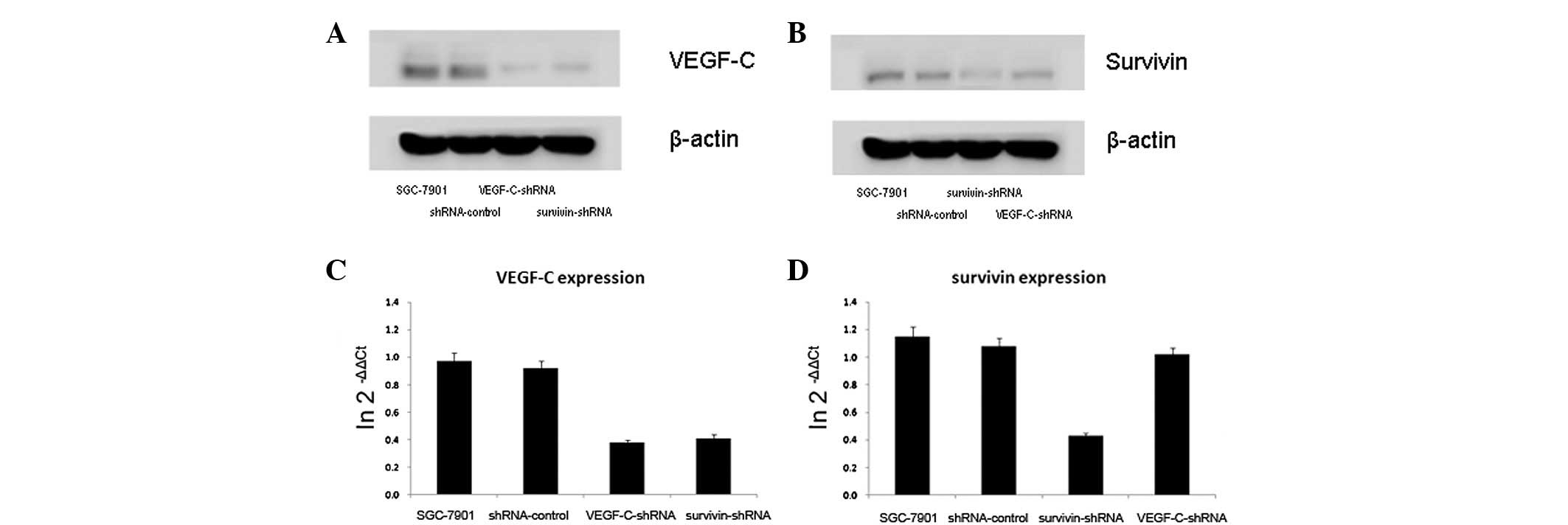|
1
|
Ferlay J, Shin HR, Bray F, Forman D,
Mathers C and Parkin DM: Estimates of worldwide burden of cancer in
2008: GLOBOCAN 2008. Int J Cancer. 127:2893–2917. 2010. View Article : Google Scholar : PubMed/NCBI
|
|
2
|
Iida A, Hirose K, Arai M, Yamaguchi A and
Nakagawara G: Relationships among the expression of epidermal
growth factor receptor, proliferating cell nuclear antigen labeling
index, and lymph node metastasis in gastric cancer. Oncology.
52:189–195. 1995. View Article : Google Scholar
|
|
3
|
Murata H, Kawano S, Tsuji S, et al:
Cyclooxygenase-2 overexpression enhances lymphatic invasion and
metastasis in human gastric carcinoma. Am J Gastroenterol.
94:451–455. 1999. View Article : Google Scholar : PubMed/NCBI
|
|
4
|
Yonemura Y, Endo Y, Fujita H, et al: Role
of vascular endothelial growth factor C expression in the
development of lymph node metastasis in gastric cancer. Clin Cancer
Res. 5:1823–1829. 1999.PubMed/NCBI
|
|
5
|
Miyachi K, Sasaki K, Onodera S, et al:
Correlation between survivin mRNA expression and lymph node
metastasis in gastric cancer. Gastric Cancer. 6:217–224. 2003.
View Article : Google Scholar : PubMed/NCBI
|
|
6
|
Srinivasula SM and Ashwell JD: IAPs:
what’s in a name? Mol Cell. 30:123–135. 2008.
|
|
7
|
Altieri DC: The molecular basis and
potential role of survivin in cancer diagnosis and therapy. Trends
Mol Med. 7:542–547. 2001. View Article : Google Scholar : PubMed/NCBI
|
|
8
|
Wang TT, Qian XP and Liu BR: Survivin:
potential role in diagnosis, prognosis and targeted therapy of
gastric cancer. World J Gastroenterol. 13:2784–2790.
2007.PubMed/NCBI
|
|
9
|
Chandele A, Prasad V, Jagtap JC, Shukla R
and Shastry PR: Upregulation of survivin in G2/M cells and
inhibition of caspase 9 activity enhances resistance in
staurosporine-induced apoptosis. Neoplasia. 6:29–40. 2004.
View Article : Google Scholar
|
|
10
|
Da CL, Xin Y, Zhao J and Luo XD:
Significance and relationship between Yes-associated protein and
survivin expression in gastric carcinoma and precancerous lesions.
World J Gastroenterol. 15:4055–4061. 2009. View Article : Google Scholar : PubMed/NCBI
|
|
11
|
Xiaoyuan C, Longbang C, Jinghua W, et al:
Survivin: a potential prognostic marker and chemoradiotherapeutic
target for colorectal cancer. Ir J Med Sci. 179:327–335. 2010.
View Article : Google Scholar : PubMed/NCBI
|
|
12
|
Mandriota SJ, Jussila L, Jeltsch M, et al:
Vascular endothelial growth factor-C-mediated lymphangiogenesis
promotes tumour metastasis. EMBO J. 20:672–682. 2001. View Article : Google Scholar : PubMed/NCBI
|
|
13
|
Kawakami M, Yanai Y, Hata F and Hirata K:
Vascular endothelial growth factor C promotes lymph node metastasis
in a rectal cancer orthotopic model. Surg Today. 35:131–138. 2005.
View Article : Google Scholar : PubMed/NCBI
|
|
14
|
Stacker SA, Achen MG, Jussila L, Baldwin
ME and Alitalo K: Lymphangiogenesis and cancer metastasis. Nat Rev
Cancer. 2:573–583. 2002. View
Article : Google Scholar : PubMed/NCBI
|
|
15
|
Shida A, Fujioka S, Kobayashi K, et al:
Expression of vascular endothelial growth factor (VEGF)-C and -D in
gastric carcinoma. Int J Clin Oncol. 11:38–43. 2006. View Article : Google Scholar : PubMed/NCBI
|
|
16
|
Dikken JL, van de Velde CJ, Gönen M, et
al: The New American Joint Committee on Cancer/International Union
Against Cancer staging system for adenocarcinoma of the stomach:
increased complexity without clear improvement in predictive
accuracy. Ann Surg Oncol. 19:2443–2451. 2012. View Article : Google Scholar
|
|
17
|
Chomczynski P and Sacchi N: Single-step
method of RNA isolation by acid guanidinium
thiocyanate-phenol-chloroform extraction. Anal Biochem.
162:156–159. 1987. View Article : Google Scholar : PubMed/NCBI
|
|
18
|
Pennati M, Folini M and Zaffaroni N:
Targeting survivin in cancer therapy. Expert Opin Ther Targets.
12:463–476. 2008. View Article : Google Scholar
|
|
19
|
Al-Joudi FS, Iskandar ZA, Hasnan J, et al:
Expression of survivin and its clinicopathological correlations in
invasive ductal carcinoma of the breast. Singapore Med J.
48:607–614. 2007.PubMed/NCBI
|
|
20
|
Kim YH, Kim SM, Kim YK, Hong SP, Kim MJ
and Myoung H: Evaluation of survivin as a prognostic marker in oral
squamous cell carcinoma. J Oral Pathol Med. 39:368–375.
2010.PubMed/NCBI
|
|
21
|
Su L, Wang Y, Xiao M, Lin Y and Yu L:
Up-regulation of survivin in oral squamous cell carcinoma
correlates with poor prognosis and chemoresistance. Oral Surg Oral
Med Oral Pathol Oral Radiol Endod. 110:484–491. 2010. View Article : Google Scholar : PubMed/NCBI
|
|
22
|
Ryan BM, O’Donovan N and Duffy MJ:
Survivin: a new target for anti-cancer therapy. Cancer Treat Rev.
35:553–562. 2009. View Article : Google Scholar : PubMed/NCBI
|
|
23
|
Makinen T, Jussila L, Veikkola T, et al:
Inhibition of lymphangiogenesis with resulting lymphedema in
transgenic mice expressing soluble VEGF receptor-3. Nat Med.
7:199–205. 2001. View
Article : Google Scholar : PubMed/NCBI
|
|
24
|
Wirzenius M, Tammela T, Uutela M, et al:
Distinct vascular endothelial growth factor signals for lymphatic
vessel enlargement and sprouting. J Exp Med. 204:1431–1440. 2007.
View Article : Google Scholar : PubMed/NCBI
|
|
25
|
Ding S, Li C, Lin S, et al: Distinct roles
of VEGF-A and VEGF-C in tumour metastasis of gastric carcinoma.
Oncol Rep. 17:369–375. 2007.PubMed/NCBI
|
|
26
|
Papapetropoulos A, Fulton D, Mahboubi K,
et al: Angiopoietin-1 inhibits endothelial cell apoptosis via the
Akt/survivin pathway. J Biol Chem. 275:9102–9105. 2000. View Article : Google Scholar : PubMed/NCBI
|
|
27
|
Mesri M, Morales-Ruiz M, Ackermann EJ, et
al: Suppression of vascular endothelial growth factor-mediated
endothelial cell protection by survivin targeting. Am J Pathol.
158:1757–1765. 2001. View Article : Google Scholar : PubMed/NCBI
|
|
28
|
Zhao P, Meng Q, Liu LZ, You YP, Liu N and
Jiang BH: Regulation of survivin by PI3K/Akt/p70S6K1 pathway.
Biochem Biophys Res Commun. 395:219–224. 2010. View Article : Google Scholar : PubMed/NCBI
|
|
29
|
Asanuma H, Torigoe T, Kamiguchi K, et al:
Survivin expression is regulated by coexpression of human epidermal
growth factor receptor 2 and epidermal growth factor receptor via
phosphatidylinositol 3-kinase/AKT signaling pathway in breast
cancer cells. Cancer Res. 65:11018–11025. 2005. View Article : Google Scholar
|
|
30
|
Tsutsui S, Matsuyama A, Yamamoto M, et al:
The Akt expression correlates with the VEGF-A and -C expression as
well as the microvessel and lymphatic vessel density in breast
cancer. Oncol Rep. 23:621–630. 2010. View Article : Google Scholar : PubMed/NCBI
|
|
31
|
Xiang L, Xie G, Ou J, Wei X, Pan F and
Liang H: The extra domain A of fibronectin increases VEGF-C
expression in colorectal carcinoma involving the PI3K/AKT signaling
pathway. PLoS One. 7:e353782012. View Article : Google Scholar : PubMed/NCBI
|
|
32
|
Song IH, Kim DW, Shin KC, et al:
Down-regulation of survivin in growth inhibition of hepatoma cells
induced by a selective cyclooxygenase-2 inhibitor. Korean J
Hepatol. 14:351–359. 2008.(In Korean).
|
|
33
|
Jang JW: Anti-tumor mechanisms and
regulation of survivin by selective cyclooxygenase-2 inhibitor.
Korean J Hepatol. 14:305–308. 2008.(In Korean).
|
|
34
|
Iwata C, Kano MR, Komuro A, et al:
Inhibition of cyclooxygenase-2 suppresses lymph node metastasis via
reduction of lymphangiogenesis. Cancer Res. 67:10181–10189. 2007.
View Article : Google Scholar : PubMed/NCBI
|
|
35
|
Bhattacharjee RN, Timoshenko AV, Cai J and
Lala PK: Relationship between cyclooxygenase-2 and human epidermal
growth factor receptor 2 in vascular endothelial growth factor C
up-regulation and lymphangiogenesis in human breast cancer. Cancer
Sci. 101:2026–2032. 2010. View Article : Google Scholar
|
|
36
|
Di JM, Zhou J, Zhou XL, et al:
Cyclooxygenase-2 expression is associated with vascular endothelial
growth factor-C and lymph node metastases in human prostate cancer.
Arch Med Res. 40:268–275. 2009. View Article : Google Scholar : PubMed/NCBI
|
|
37
|
Zhang J, Ji J, Yuan F, et al:
Cyclooxygenase-2 expression is associated with VEGF-C and lymph
node metastases in gastric cancer patients. Biomed Pharmacother.
59(Suppl 2): S285–S288. 2005. View Article : Google Scholar : PubMed/NCBI
|

















